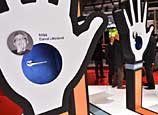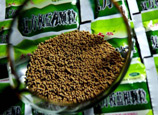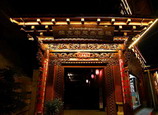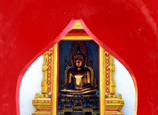
Recalling the English words marked on parts or logos of jeans she worked on, Tang Shuxiu, 53, once a model worker at Nanjing Turbine and Electric Machinery Group in Jiangsu Province, never thought her skills at work would one day be of use in a "reeducation through labor" center.
Tang was put into Jiangsu provincial labor reeducation center for women for a one-year stretch starting from April 6, 2011 after she kept petitioning to be given an apartment in Nanjing city center, as promised by her company.
"I still remember the screams of inmates at the center as they were beaten by older inmates who were drug traffickers. They sounded like frightened and wounded animals and their voices scared me to the bone," Tang said, describing how long-term inmates beat newcomers who slowed down on the assembly line.
She joined hundreds of women at the labor camp working day and night making jeans and toys.
According to the law, people who committed minor offenses can be sent to reeducation through labor centers without trial. But rules stipulate that they should have spent at least three hours a day learning regulations and rules but no more than six hours working.
Quotas to be filled
"There are around 40 people in one working unit, toiling on an assembly line to make goods for export. We needed to make about 900 pair of jeans a day, but according to the guards, they were only sold for slightly more than 3 yuan for each pair," Tang said.
Teng Xiaoming was 61 when he was put into Dalianshan labor reeducation center in Nanjing in November 2009. He didn't enjoy any favorable treatment for his old age and had to work until late at night to make up his daily quota of knotting bag laces.
His suffering was as a result of years of petitioning for more compensation after his 1,000-square-meter houses were demolished by local governments.
"It was hard for me to see sunlight during my days at the center. I got up around 5:30 am in the morning and worked at least until 10 pm every day," Teng told the Global Times, adding that he was often called to the workshop again during the night to finish his quota.
Lying in Jiangning district, just over an hour's drive from the center of Nanjing, Dalianshan labor reeducation center was established in 1970 and it currently has 135 employees. The center has three major sections, including dorms and factories for detainees, office buildings for police and a training center for guards.
Surrounded by walls over six meters high and fences equipped with surveillance cameras, the labor reeducation center keeps a veil of secrecy. The sound of patriotic songs being sung by inmates can be heard during breaks at noon or in the evening while the factory lights can be seen from a nearby hill until past 8 pm.
"I rarely saw them shut down operations early as we basically worked until 9 or 10 pm every day. Whenever there was an early shutdown, we cheered as if we were at a wedding banquet," said Li Long, a former detainee and now a free legal consultant for those put into labor reeducation centers or victims of forced demolitions.
Unmarked trucks can be seen driving out from the center but there were no sign of police officers outside, giving the center an eerie feeling during the day.
A man surnamed Zhu who lives near the center told the Global Times that he learned the center was producing shoes and tent canvasses for private businesses who not only put in orders with the center's authorities but would also sometimes visit the center to check up on their order.
Li Long kept an eye on who he was making these products for and found out from containers used to put the shoes in that they were made for the Yangzhou Hetai Plush and Carpet Industrial Corporation. But according to the information published on the company's website, it only produces carpets and rugs.
The information couldn't be confirmed by local authorities. But "Made in China" labels bearing number tags indicating that they were to be attached to textile shoe soles were found in a garbage dump behind the center.
"I remember these although I had no idea what was written on them. I used to glue them onto the shoes," Li Long said.



















![]()
